Friday, April 19, 2024. Annette’s News Roundup.
I think the Roundup makes people feel not so alone.
To read an article excerpted in this Roundup, click on its blue title. Each “blue” article is hyperlinked so you can read the whole article.
Please feel free to share.
Invite at least one other person to subscribe today! https://buttondown.email/AnnettesNewsRoundup
Remember: when you share the Roundup, you are fighting Fascism and helping to bring about a Democratic victory in 2024.
____________________________________________
Joe is always busy.
3 days of campaigning in Pennsylvania, a “needed to win” state in 2024.
Joe accepted endorsements from at least 15 members of the Kennedy klan, including 6 of Robert Kennedy Jr’s siblings, in Philadelphia on Thursday.
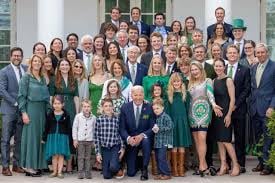
In a show of force against RFK Jr., members of the Kennedy family will appear en masse to endorse Biden at a campaign event today.
— Axios (@axios) April 18, 2024
https://t.co/mKlmYKjIGT
President Joe Biden pays respects to his uncle, World War II veteran Ambrose J, Finnegan, Jr., at the Veterans War Memorial in Scranton, Pennsylvania, on Wednesday. pic.twitter.com/8gULgL6utl
— Al Drago (@Al_Drago) April 17, 2024
The national security supplemental package will get urgent aid to Ukraine as they face continued bombardment from Russia.
— President Biden (@POTUS) April 18, 2024
I urge Congress to pass this package as soon as possible and show the world that America stands with our friends.
____________________________________________
Russian interference persists.
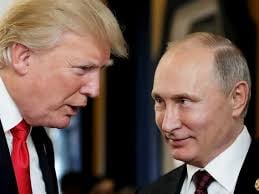
In 2016, Russia took aim at our election. This time Putin aims at our foreign policy as well.
Historian Heather Cox Richardson - Russia and Trump Republicans work to undermine American foreign (and other) policy.
Yesterday on the social media site X, formerly Twitter, Miles Taylor wrote: “After 2016, I helped lead the US gov[ernmen] to response to Russia’s election interference. In 2024, foreign interference will be worse. Tech[nology is] more powerful. Adversaries more brazen. American public more susceptible. Political leaders across party lines MUST UNITE against this.”
Taylor served as chief of staff in the Department of Homeland Security under Trump.
Today, Catherine Belton of the Washington Post reported on a secret 2023 document from Russia’s Foreign Ministry calling for an “offensive information campaign” and other measures that attack “‘a coalition of unfriendly countries’ led by the United States. Those measures are designed to affect “the military-political, economic and trade and informational psychological spheres” of Russia’s perceived adversaries.
The plan is to weaken the United States and convince other countries, particularly those in the North Atlantic Treaty Organization, that the U.S. will not stand by its allies. By weakening those alliances, Russian leaders hope to shift global power by strengthening Russia’s ties to China, Iran, and North Korea and filling the vacuum left by the crumbling democratic alliances (although it is not at all clear that China is on board with this plan).
According to Belton, one of the academics who advised the authors of the Russian document suggested that Russia should “continue to facilitate the coming to power of isolationist right-wing forces in America,” “enable the destabilization of Latin American countries and the rise to power of extremist forces on the far left and far right there,” increase tensions between the U.S. and China over Taiwan, and “escalate the situation in the Middle East around Israel, Iran and Syria to distract the U.S. with the problems of this region.”
The Russian document suggests that the front lines of that physical, political, and psychological fight are in Ukraine. It says that the outcome of Russia’s invasion of neighboring Ukraine will “to a great degree determine the outlines of the future world order.”
Putin critic Mikhail Khodorkovsky told Belton: “The Americans consider that insofar as they are not directly participating in the war [in Ukraine], then any loss is not their loss. “This is an absolute misunderstanding.”
Media and lawmakers, including those in the Republican Party, have increasingly called out the degree to which Russian propaganda has infiltrated American politics through Republican lawmakers and media figures.
Earlier this month, both Representative Michael R. Turner (R-OH), chair of the House Intelligence Committee, and Representative Michael McCaul (R-TX), chair of the House Foreign Affairs Committee, warned about Russian disinformation in their party. Turner told CNN’s State of the Union that it is “absolutely true” that Republican members of Congress are parroting Russian propaganda. “We see directly coming from Russia attempts to mask communications that are anti-Ukraine and pro-Russia messages, some of which we even hear being uttered on the House floor.” When asked which Republicans had fallen to Russian propaganda, McCaul answered that it is “obvious.”
That growing popular awareness has highlighted that House Republicans under House Speaker Mike Johnson (R-LA) have for six months refused to pass a national security supplemental bill with additional aid for Ukraine, as well as for Israel and the Indo-Pacific, and humanitarian aid to Gaza. After the Senate spent two months negotiating border security provisions House Republicans demanded, Republicans killed that bill with the provisions at Trump’s direction, and the Senate then passed a bill without those provisions in February.
Johnson has been coordinating closely with former president Trump, who has made his admiration for Russia and his disregard for Ukraine very clear since his people weakened their support for Ukraine in the 2016 Republican Party platform. Johnson is also under pressure from MAGA Republicans in the House, like Marjorie Taylor Greene (R-GA), who oppose funding Ukraine, some of them by making statements that echo Russian propaganda.
While the White House, the Pentagon, and a majority of both chambers of Congress believe that helping Ukraine defend itself is crucial to U.S. security, Johnson has refused to take the Senate measure up, even though the House would pass it if he did. But as Ukraine’s ability to defend itself has begun to weaken, pressure for additional aid has ramped up. At the same time, in the wake of Iran’s attack on Israel last weekend, Republicans have suddenly become eager to provide additional funds to Israel. It began to look as if Johnson might bring up some version of foreign aid.
But discussions of bringing forward Ukraine aid brought not only Greene but also Thomas Massie (R-KY) to threaten yesterday to challenge Johnson’s speakership, and there are too few Republicans in the House to defend him.
Today, Johnson brought forward not the Senate bill, but rather three separate bills to fund Israel, the Indo-Pacific, and Ukraine, with pieces that House Republicans have sought. A fourth bill will include other measures Republicans have demanded. And a fifth will permit an up-or-down vote on most of the measures in the extreme border bill the House passed in 2023. At the time, that measure was intended as a signaling statement because House Republicans knew that the Democratic Senate would keep it from becoming law.
Johnson said he expected to take a final vote on the measures Saturday evening. He will almost certainly need Democratic votes to pass them, and possibly to save his job. Democrats have already demanded the aid to Gaza that was in the Senate bill but is not yet in the House bills.
Reese Gorman, political reporter for The Daily Beast, reported that Johnson explained his change of heart like this: “Look, history judges us for what we do. This is a critical time right now… I can make a selfish decision and do something that is different but I'm doing here what I believe to be the right thing.… I think providing lethal aid to Ukraine right now is critically important.… I’m willing to take personal risk for that.”
His words likely reflect a changing awareness in Republican Party leadership that the extremism of MAGA Republicans is exceedingly unpopular. Trump’s courtroom appearances—where, among other things, he keeps falling asleep—are unlikely to bolster his support, while his need for money is becoming more and more of a threat both to his image and to his fellow Republicans.
Today the Trump campaign asked Republican candidates in downballot races for at least 5% of the money they raise with any fundraising appeal that uses Trump’s name or picture. They went on: “Any split that is higher than 5% will be seen favorably by the RNC and President Trump’s campaign and is routinely reported to the highest levels of leadership within both organizations.”
Nonetheless, Greene greeted Johnson’s bills with amendments requiring members of Congress to “conscript in the Ukrainian military” if they voted for aid to Ukraine.
A headline on the Fox News media website today suggested that a shift away from MAGA is at least being tested. It read: “Marjorie Taylor Greene is an idiot. She is trying to wreck the [Republican Party].”
The article pointed out that 61% of registered voters disapprove of the Republican Party while only 36% approve.
That approval rating has indeed fallen at least in part because of the performative antics of the extremists, among them the impeachment of Homeland Security Secretary Alejandro Mayorkas that made him the first cabinet officer to be impeached in almost 150 years. Today the Senate killed that impeachment without a trial.
As soon as Johnson announced the measures, President Joe Biden threw his weight behind them. In a statement, he said: “I strongly support this package to get critical support to Israel and Ukraine, provide desperately needed humanitarian aid to Palestinians in Gaza, and bolster security and stability in the Indo-Pacific. Israel is facing unprecedented attacks from Iran, and Ukraine is facing continued bombardment from Russia that has intensified dramatically in the last month.
“The House must pass the package this week and the Senate should quickly follow. I will sign this into law immediately to send a message to the world: We stand with our friends, and we won’t let Iran or Russia succeed.”
(Letters from an American)
___
One more thing. Or two.
Here 👇 is Catherine Belton’s article from the Washington Post describing the Russian plan against America.
Secret Russian foreign policy document urges action to weaken the U.S.
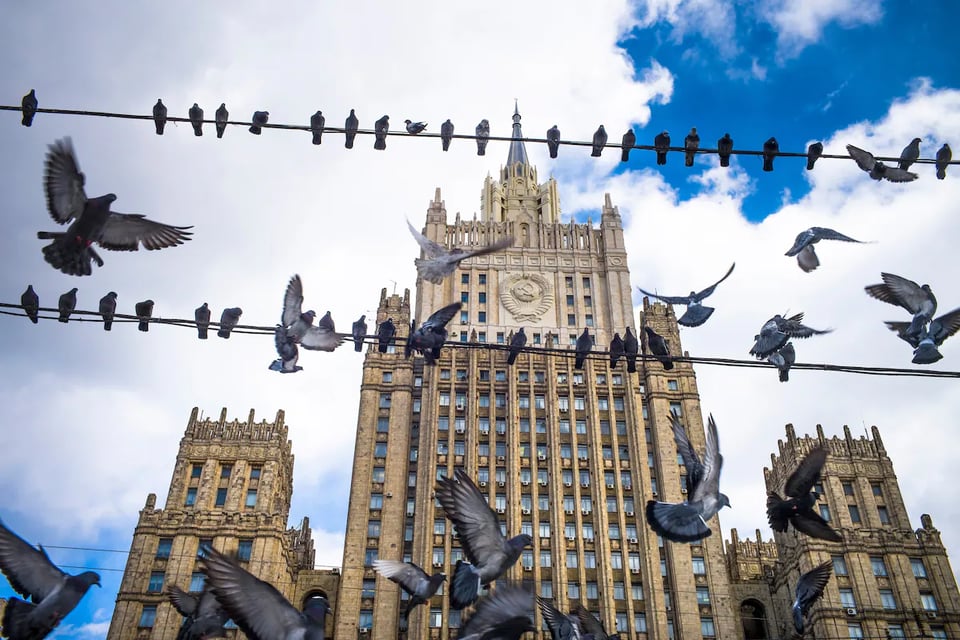
The Russian Foreign Ministry building in Moscow. (Alexander Zemlianichenko/AP).
Russia’s Foreign Ministry has been drawing up plans to try to weaken its Western adversaries, including the United States, and leverage the Ukraine war to forge a global order free from what it sees as American dominance, according to a secret Foreign Ministry document.
In a classified addendum to Russia’s official — and public — “Foreign Policy Concept of the Russian Federation,” the ministry calls for an “offensive information campaign” and other measures spanning “the military-political, economic and trade and informational psychological spheres” against a “coalition of unfriendly countries” led by the United States.
“We need to continue adjusting our approach to relations with unfriendly states,” states the 2023 document, which was provided to The Washington Post by a European intelligence service. “It’s important to create a mechanism for finding the vulnerable points of their external and internal policies with the aim of developing practical steps to weaken Russia’s opponents.”
The document for the first time provides official confirmation and codification of what many in the Moscow elite say has become a hybrid war against the West. Russia is seeking to subvert Western support for Ukraine and disrupt the domestic politics of the United States and European countries, through propaganda campaigns supporting isolationist and extremist policies, according to Kremlin documentspreviously reported on by The Post. It is also seeking to refashion geopolitics, drawing closer to China, Iran and North Korea in an attempt to shift the current balance of power.
Using much tougher and blunter language than the public foreign policy document, the secret addendum, dated April 11, 2023, claims that the United States is leading a coalition of “unfriendly countries” aimed at weakening Russia because Moscow is “a threat to Western global hegemony.” The document says the outcome of Russia’s war in Ukraine will “to a great degree determine the outlines of the future world order,” a clear indication that Moscow sees the result of its invasion as inextricably bound with its ability — and that of other authoritarian nations — to impose its will globally.
The Foreign Policy Concept of the Russian Federation, which was published March 31, 2023, and approved by Russian President Vladimir Putin, deploys bland diplomatic language to call for “the democratization of international relations,” “sovereign equality” and the strengthening of Russia’s position on the global stage. Though the Foreign Policy Concept also charges that the United States and “its satellites” have used the Ukraine conflict to escalate “a many-years-long anti-Russia policy,” it also states that “Russia does not consider itself an enemy of the West … and has no ill intentions toward it.”
Russia hopes the West will “realize the lack of any future in its confrontational policy and hegemonistic ambitions, and will accept the complicated realities of the multipolar world,” the public document states.
The Russian Foreign Ministry said in a statement that it did not comment “on the existence or nonexistence of internal ministry documents” and on the progress of work on them. “As we have stated several times on different levels, we can confirm the mood is to decisively combat the aggressive steps taken by the collective West as part of the hybrid war launched against Russia,” the ministry added.
Russia’s recent veto against extending U.N. monitoring of sanctions against North Korea over its nuclear weapons and ballistic missiles program, effectively ending 14 years of cooperation, was “a clear sign” that the work contemplated in the classified addendum is already underway, said a leading Russian academic with close ties to senior Russian diplomats. The academic spoke on the condition of anonymity to discuss sensitive deliberations in Moscow.
Russia can create difficulties for the U.S. in many different regions of the world,” the academic said. “This is about the Middle East, northeast Asia, the African continent and even Latin America.”
The creation of the Foreign Policy Concept and the classified addendum followed a call to Russian academics for policy suggestions. One proposal submitted in February 2023 to the Foreign Ministry by the deputy head of Moscow’s Institute for the Commonwealth of Independent States, which maintains close ties to Russia’s security apparatus, laid out Russia’s options more bluntly still.
The academic, Vladimir Zharikhin, called for Russia to “continue to facilitate the coming to power of isolationist right-wing forces in America,” “enable the destabilization of Latin American countries and the rise to power of extremist forces on the far left and far right there,” as well as facilitate “the restoration of European countries’ sovereignty by supporting parties dissatisfied with economic pressure from the U.S.”
Other points in the policy proposal, which was also provided to The Post, suggested that Moscow stoke conflict between the United States and China over Taiwan to bring Russia and China closer together, as well as “to escalate the situation in the Middle East around Israel, Iran and Syria to distract the U.S. with the problems of this region.”
Zharikhin declined to discuss his proposal.
Western officials have warned that Russia has been escalating its propaganda and influence campaigns over the past two years as it seeks to undermine support for Ukraine. As part of that, it has sought to create a new global divide, with Russian propaganda efforts against the West resonating in many countries in the Middle East, Africa, Latin America and Asia.
“I think the U.S. was convinced that the rest of the world — North and South — would support the U.S. in the conflict with Russia and it turned out that this was not true,” Zharikhin told The Post in an earlier interview. “This demonstrates the single polar world is over, and the U.S. doesn’t want to come to terms with this.”
For Mikhail Khodorkovsky — the longtime Putin critic who was once Russia’s richest man until a clash with the Kremlin landed him 10 years in prison — it is not surprising that Russia is seeking to do everything it can to undermine the United States. “For Putin, it is absolutely natural that he should try to create the maximum number of problems for the U.S.,” he said. “The task is to take the U.S. out of the game, and then destroy NATO. This doesn’t mean dissolving it, but to create the feeling among people that NATO isn’t defending them.”
The long congressional standoff on providing more weapons to Ukraine was only making it easier for Russia to challenge Washington’s global power, he said.
“The Americans consider that insofar as they are not directly participating in the war [in Ukraine], then any loss is not their loss,” Khodorkovsky said. “This is an absolute misunderstanding.”
A defeat for Ukraine, he said, “means that many will stop fearing challenging the U.S.” and the costs for the United States will only increase. (The Washington Post).
Top Republican warns pro-Russia messages are echoed ‘on the House floor.’
The latest remarks come after another GOP member said Russian propaganda has ‘infected’ the Republican base.
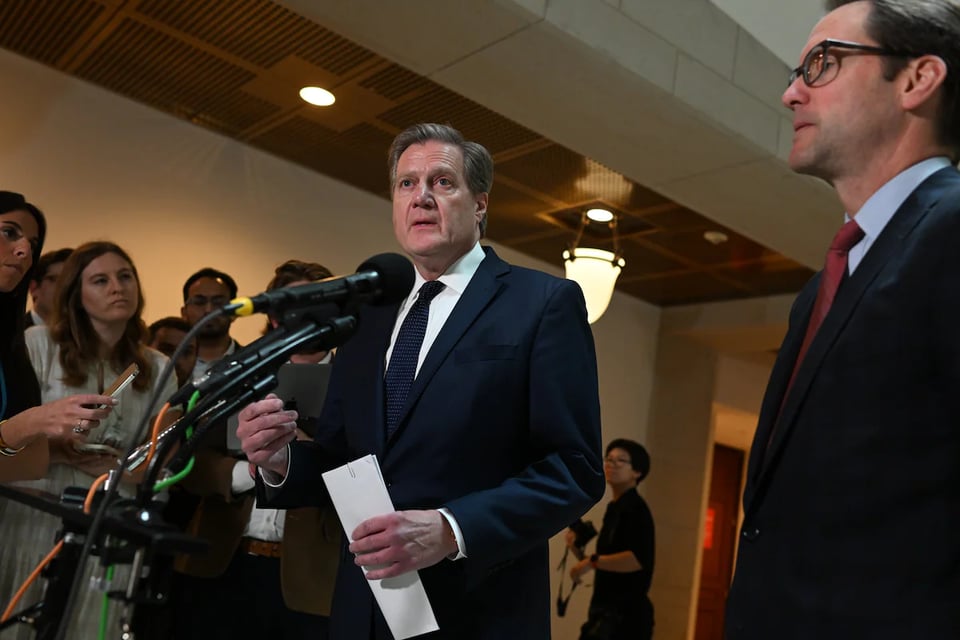
Rep. Michael R. Turner (R-Ohio), who chairs the House Permanent Select Committee on Intelligence, warns that pro-Russian propaganda is infiltrating the Republican Party.
Rep. Michael R. Turner (R-Ohio), who chairs the House Permanent Select Committee on Intelligence, said Sunday that it was “absolutely true” that some Republican members of Congress were repeating Russian propaganda about the invasion of Ukraine instigated by Russian President Vladimir Putin.
Turner did not specify which members he was referring to, but he said he agreed with House Foreign Affairs Committee Chair Michael McCaul (R-Tex.), who said in an interview with Puck News last week that Russian propaganda had “infected a good chunk of my party’s base” and suggested that conservative media was to blame.
When asked on Sunday, Turner said he agreed with McCaul’s sentiments.

Anti-Ukrainian Ohio Senator J. D. Vance with MAGA House members Matthew Gaetz and Marjorie Taylor Greene.
“We see directly coming from Russia attempts to mask communications that are anti-Ukraine and pro-Russia messages — some of which we even hear being uttered on the House floor,” Turner said on CNN’s “State of the Union.” (The Washington Post, April 8)
___
Johnson Pushes Ahead on Foreign Aid Bill, Teeing Up a Weekend Vote.
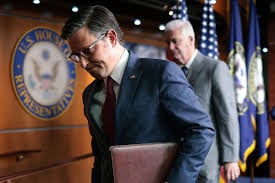
The embattled Republican speaker said he expected Saturday votes on the long-stalled package of aid to Ukraine, Israel and other U.S. allies, as well as fresh sanctions on Iran. (New York Times).
Will this happen on Saturday?
____________________________________________
First week of the first Trump criminal trial on Election Interference.
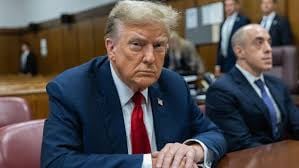
New York Times editorial - Donald Trump and American Justice.
The former and possibly future president of the United States is now on trial in Lower Manhattan, the first criminal prosecution of an American elected to the nation’s highest office. Donald Trump, who relentlessly undermined the justice system while in office and since, is enjoying the same protections and guarantees of fairness and due process before the law that he sought to deny to others during his term.
A jury of Americans will ultimately decide Mr. Trump’s legal fate. It may be the only one of the four criminal cases against the former president that comes to trial before the November election. Though the election interference charges are not the most serious of those he faces, the case will determine whether 12 of his fellow Americans find him guilty of a felony — a result that most voters say they would consider to be serious.
In the first two days of this trial, Mr. Trump has offered a defense of himself to the public, in brief appearances between his courtroom table and the television cameras: He portrays himself as a victim of an unfair and politically motivated prosecution. That defense is built on lies. Mr. Trump is no victim. He is fortunate to live in a country where the rule of law guarantees a presumption of innocence and robust rights for defendants.
A guiding principle of the American experiment is that the law applies to everyone equally. At the same time, prosecuting any current or former elected official requires vigilance against bias and awareness about how the case will be perceived by the public. For this reason, judges and prosecutors have an obligation to hew to stringent standards of fairness, to reduce the risk that they appear to be interfering in electoral politics by using criminal cases to damage or favor one candidate over another.
The former president refers to the four prosecutions he faces as “witch hunts” motivated by partisanship and part of a nefarious scheme to keep him from returning to the White House. He has repeated this narrative even though the prosecutions have been brought by different prosecutors around the country, and even though different grand juries, each composed of a random selection of regular citizens in different states, handed up indictments that now total 88 felony charges against him.
In the weeks leading up to the start of this trial, Mr. Trump has argued, dishonestly, that the judge and the prosecutor have treated him unfairly, and that it will be impossible for him to get a fair trial in Manhattan because New Yorkers are biased against him. But the opening days of the trial, devoted to jury selection, have already demonstrated the great care and respect with which everyone involved in the trial, except for Mr. Trump, has treated the process. Joshua Steinglass, a member of the office of the Manhattan district attorney, Alvin Bragg, told potential jurors on Tuesday that the case “has nothing to do with personal politics.”
“We don’t suggest you need to have been living under a rock for the last eight years, or the last 30 years,” he said. “We don’t expect you not to have heard about this, or not to have discussed this case with friends. What we do need is for you to keep an open mind.”
Dozens of potential jurors took those instructions seriously and admitted they could not be impartial. One man was excused from service after telling the judge that it was “going to be hard for me to be impartial,” since many of his family members and friends were Republicans. Justice Juan Merchan, the judge overseeing the trial, excused him, as other potential jurors stepped up. So far, seven jurors have been seated. At least two potential jurors were dismissed by the judge because of social media posts.
If anything, Justice Merchan has exhibited an extra degree of tolerance for Mr. Trump’s strategy of systematically attacking the legitimacy of the courts and court officials through repeated verbal outbursts and countless legal motions and other attempts to delay his trials. In the New York case, Mr. Trump received a short extension last month when federal prosecutors found a tranche of documents that had not been turned over to the defense team. In the week before the start of the trial, he filed three emergency appeals in three days, as The Times reported, including a civil action against the judge, which were quickly rejected by an appeals court.
The fact that he was able to have each of these motions fully considered is evidence of the justice system operating as it should, with deliberation and due process. Especially in criminal prosecutions, courts take the legal rights of litigants very seriously, to ensure that defendants receive fair trials. An appeals court is still considering Mr. Trump’s request to throw out a gag order that prevents him from verbally attacking witnesses, prosecutors or the judge’s family, but it will not delay the trial before the ruling. (Mr. Trump is not prevented from publicly criticizing the judge.)
In the other criminal cases against him, Mr. Trump has also been able to take full advantage of every legal protection available to him as a defendant.
He appealed his federal prosecution related to the Jan. 6 insurrection at the Capitol on the grounds that he enjoys absolute immunity for actions he took as president. This argument has been rejected by every judge to consider it. Still, the Supreme Court agreed to hear the appeal later this month, delaying the start of his trial in that case indefinitely, and possibly until after the election. While the Supreme Court weighs his immunity claim, the trial judge in the federal Jan. 6 case, Tanya Chutkan, put the proceedings on hold. In the other federal prosecution, on charges of illegally withholding highly classified national-security documents, Mr. Trump has had numerous favorable rulings from the judge handling that case.
The election-interference case out of Georgia was delayed by an extensive hearing on a possible conflict of interest for the lead prosecutor, Fani Willis, who had been in a romantic relationship with Nathan Wade, an outside prosecutor she hired to lead the case. After taking testimony from a series of witnesses, the judge decided Ms. Willis could remain on the case, but not with Mr. Wade. (Mr. Wade ultimately withdrew.) Mr. Trump appealed that decision, which the Georgia Court of Appeals is now considering.
The ability to file such appeals, successful or not, is essential to how the law functions in the United States. Despite having benefited from its protections, to Mr. Trump, the rule of law is nothing more than an obstacle to be overcome, an instrument of power to use at will.
Mr. Trump’s vision of an American legal system that protects his interests goes beyond his trial, of course, and extends in particular to the Justice Department. He has been explicit about his desire, if elected in November, to bring the Justice Department more fully under his control, to use it to protect his friends and, more important, punish his enemies. As president, Mr. Trump had an unparalleled record of abusing presidential pardons, and if he is re-elected, he appears likely to order the Justice Department to drop the criminal cases against him or to try to pardon himself for potential crimes. To Mr. Trump, independent prosecutors and Justice Department officials are precisely the problem. They will say no to him when he wants to do things that are illegal or unconstitutional, choosing to be faithful to the Constitution rather than to him. This Mr. Trump cannot abide.
Mr. Trump has said he intends to find a prosecutor to “go after” Mr. Biden and his family, suggesting that he intends to pursue prosecution with little regard to evidence or facts. According to The Washington Post, he also wants to investigate figures in his administration whom he perceives as being disloyal to him, including John Kelly, his former chief of staff; William Barr, his former attorney general; and Gen. Mark Milley, the former chair of the Joint Chiefs of Staff. (Mr. Trump has separately suggested General Milley should be executedfor treason.)
As Mr. Kelly told The Post, “There is no question in my mind he is going to go after people that have turned on him.”
Mr. Trump has also repeatedly said that his prosecution is like no other. In fact, there are numerous examples of politicians, of both parties, who faced prosecution, and in some cases were convicted, during their candidacies. The former Texas governor Rick Perry, a Republican, ran for president in 2016 while under indictment for abuse of power. (Those charges were later dismissed.) Senator Robert Menendez, a Democrat of New Jersey, was indicted on federal bribery charges, and may run for re-election as an independent.
The former president is singular in one respect: As much as he accuses others of warping the justice system, he is the one who consistently demeans and disparages the role of the courts and the exercise of due process. The leaders of the Republican Party, echoing the views of Mr. Trump’s fervent base of followers, have fallen in line behind him, indicating that they will continue to support his candidacy even if he is a convicted felon.
While a Manhattan jury weighs the evidence of Mr. Trump’s alleged crimes, it’s the American people who will weigh the evidence of Mr. Trump’s actions. His party has allowed him to act with impunity, but Americans voters still have the power to deliver accountability. They should consider not only the facts presented during the trial — the details about his judgment, his character and the way he conducted his life and his business — but also his disregard for the rule of law and his willingness to demean American justice when it suits his interests. Those actions render him manifestly unfit for office and would pose unique dangers to the United States during a second term. The greatest of those dangers, and the one that Americans should be most attuned to, is the damage that a second Trump presidency would inflict on the rule of law.
Day 1- 2. 7 Jurors were chosen.
Here is what we know about the the first group of jurors selected, all on Day 2.
Juror 1 is a “man who lives in West Harlem and works in sales. He is married, likes to do ‘anything outdoorsy,’ and gets news from The New York Times, Fox News and MSNBC.”
Juror 2 is “a woman who lives on the Upper East Side and works as an oncology nurse at Memorial Sloan Kettering. She is engaged and likes to spend time with family and friends and take her dog to the park. She gets news from CNN, The New York Times, Google and Facebook.”
Juror 3 is “a young man who has lived in Chelsea for five years, works as an attorney in corporate law, and likes to hike and run. He gets news from The New York Times, The Wall Street Journal and Google.”
Juror 4 is a “middle-aged man who lives on the Lower East Side and works in IT training and consulting. He is married with one child and two grandchildren. He said he has ‘no spare time.’ He gets news from the New York Daily News, The New York Times, Google and X.”
Juror 5 is a “young woman who is a Harlem resident and works as a teacher. She lives with her boyfriend, loves writing, theater and traveling. She gets news from Google and TikTok and listens to podcasts on relationships and pop culture.”
Juror 6 is “a young woman who lives in Chelsea and works as a software engineer. She gets news from The New York Times, Google, Facebook and TikTok.”
Juror 7 is another white-shoe lawyer. He lives on the Upper East Side and according to court transcripts, “enjoys spending time outdoors and with his children. He gets his news from the New York Times, New York Post, Wall Street Journal, and Washington Post.”
While he has “supported some of Trump's policies as president” he’s disagreed with some. "I don't know the man and I don't have opinions about him personally," he said. (Source. Mary Trump)
Day 3.
Source, Washington Post.
9:45 a.m. Judge excuses one of the seven jurors already selected By Perry Stein Justice Juan Merchan dismissed Juror No. 2, a nurse who said she had concerns after people she knew identified her as a juror and messaged her. She said she grew concerned about what had been reported publicly about her. Because of that, she worried about her ability to be a fair and impartial juror, after “sleeping on it overnight.” “We just lost” what would have been a good juror for the case, Merchan said.
12:18 pm . Juror number 4 was excused and told not to come back next week, the second juror to be dismissed today.
( earlier. .. Juror 4 arrived in the courthouse shortly before noon; he was supposed to get there at 9:15.
Prosecutors flagged him as a concern because someone with his name was arrested in the 1990s for tearing down right-wing posters and is married to a woman who entered a deferred prosecution agreement over corruption charges.
The questioning was done at the bench, so reporters could not hear what was said. But his answers prompted some chuckling from Trump attorney Todd Blanche.)
New York Times.
Here’s the latest in the case against the former president.
Twelve New Yorkers have been selected to decide Donald J. Trump’s criminal trial in Manhattan, the first for a former American president and a crucial challenge to his bid to regain the Oval Office.
Opening statements could begin as early as Monday, the judge overseeing the case, Juan M. Merchan, said, asking the selected jurors to return to court then.
Seven new jurors were added in short order Thursday afternoon, hours after two others who had already been picked were abruptly excused.
One alternate juror was also picked before court adjourned for the day, and the selection of alternates was set to resume on Friday.
Trump’s Behavior and what more happened in Court today.
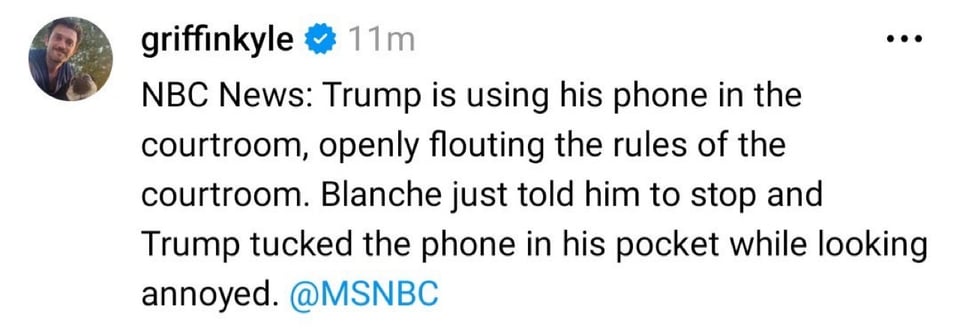
Justice Merchan ordered news outlets not to report the answer to two queries on a lengthy questionnaire for prospective jurors: “Who is your current employer?” and “Who was your prior employer?” He also directed that those answers be redacted from the transcript. (Source. New York Times).
Prosecutors urged Justice Merchan to hold Mr. Trump in contempt of court, arguing that he had repeatedly violated a gag order that bars him from attacking witnesses, prosecutors, jurors and others. Justice Merchan said he would take up the matter next week, along with previous examples of what prosecutors say was prohibited conduct.(Source. New York Times).
Trump: It is a shame. I am sitting here for days now from morning until night in that freezing room. Freezing! All for this. This is your result. It is very unfair. pic.twitter.com/K0cjplq9nH
— Acyn (@Acyn) April 18, 2024
The Final Jury.
There is redundancy here (from the earlier list of the jury chosen on Day 2) but this is a description of all those on the jury.
According to their statements in court during three days of jury selection, here is what we know about the jurors:
Juror 1, who will be the foreman, works in sales and lives in West Harlem. He said that he enjoys outdoor activities. He said he gets his news from The New York Times and watches Fox News and MSNBC. He said he had heard about some of former President Donald J. Trump’s other criminal cases, but he did not have an opinion about him.
Juror 2 works in finance and lives in Hell’s Kitchen. He said he likes hiking, music, concerts and enjoying New York City. He said he follows Mr. Trump’s former fixer, Michael D. Cohen, who is expected to be a key witness, on social media. But he also said he follows figures like former Trump adviser Kellyanne Conway. He said he believed Mr. Trump had done some good for the country, adding “it goes both ways.”
Juror 3 works in the legal field and lives in Chelsea. He said he does not follow the news closely but, when he does, he reads The New York Times and The Wall Street Journal and finds articles using Google. He added that he was not very familiar with Mr. Trump’s other criminal cases.
Juror 4 is an engineer from the Upper West Side. Asked how he was during jury selection, he responded, “I am freezing.” When a lawyer asked if he had strong feelings about Mr. Trump, he responded “No, not really.”
Juror 5 works in education and is from Harlem. She said she tries to avoid political conversations and doesn’t care for news. She said that she appreciates Mr. Trump’s candor. “President Trump speaks his mind,” she said. “I would rather that in a person than someone who’s in office and you don’t know what they’re doing behind the scenes.”
Juror 6 works in technology and lives in Chelsea. She said she gets her news from The New York Times, Google, Facebook and TikTok. She said she probably has different beliefs than Mr. Trump, but that “this is a free country.”
Juror 7 works in the legal field and lives on the Upper East Side. He said that he is aware of Mr. Trump’s other cases but does not have an opinion about Mr. Trump’s character. He said he has “political views as to the Trump presidency,” agreeing with some Trump administration policies and disagreeing with others.
Juror 8 is from the Upper East Side and worked in finance. He said he reads The New York Times and The Wall Street Journal and watches CNBC and the BBC. He enjoys fly fishing, skiing and yoga. During jury selection, he said he had no opinions or beliefs that would prevent him from being impartial.
Juror 9 works in an educational setting and is from the Upper East Side. She said of Mr. Trump that “he was our president. Everyone knows who he is,” adding that when he was in office “everyone was kind of talking about politics.”
Juror 10 is a businessman who lives in Murray Hill. He said he does not follow the news, adding, “if anything it’s The New York Times.” But he said he likes listening to podcasts on behavioral psychology, adding, “it’s my little hobby.” He said he does not have a strong opinion on Mr. Trump.
Juror 11 is a product manager and lives in Upper Manhattan. She said she does not have strong opinions about Mr. Trump but added, “I don’t like his persona, how he presents himself in public.” She then added, “I don’t like some of my co-workers, but I don’t try to sabotage their work,” drawing laughter from the jury box.
Juror 12 works in health care and lives on the Upper East Side. She said she likes listening to live music and hiking, and also listens to religious podcasts. (Source, New York Times)
NEW: The prospective Trump jurors are a highly educated bunch. The first 9 potential jurors in the box this morning include 8 with college degrees, four of whom have advanced degrees (one JD; three MBAs). 1/
— Lisa Rubin (@lawofruby) April 18, 2024
____________________________________________
What Jail Time could look like if Trump is found guilty by Norm Eisen.
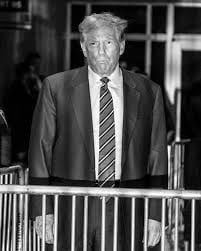
For all the attention to and debate over the unfolding trial of Donald Trump in Manhattan, there has been surprisingly little of it paid to a key element: its possible outcome and, specifically, the prospect that a former and potentially future president could be sentenced to prison time.
The case — brought by Alvin Bragg, the Manhattan district attorney, against Mr. Trump — represents the first time in our nation’s history that a former president is a defendant in a criminal trial. As such, it has generated lots of debate about the case’s legal strength and integrity, as well as its potential impact on Mr. Trump’s efforts to win back the White House.
A review of thousands of cases in New York that charged the same felony suggests something striking: If Mr. Trump is found guilty, incarceration is an actual possibility. It’s not certain, of course, but it is plausible.
Jury selection has begun, and it’s not too soon to talk about what the possibility of a sentence, including a prison sentence, would look like for Mr. Trump, for the election and for the country — including what would happen if he is re-elected.
The case focuses on alleged interference in the 2016 election, which consisted of a hush-money payment Michael Cohen, the former president’s fixer at the time, made in 2016 to a porn star, Stormy Daniels, who said she had an affair with Mr. Trump. Mr. Bragg is arguing that the cover-up cheated voters of the chance to fully assess Mr. Trump’s candidacy.
This may be the first criminal trial of a former president in American history, but if convicted, Mr. Trump’s fate is likely to be determined by the same core factors that guide the sentencing of every criminal defendant in New York State Court.
Comparable cases. The first factor is the base line against which judges measure all sentences: how other defendants have been treated for similar offenses. My research encompassed almost 10,000 cases of felony falsifying business records that have been prosecuted across the state of New York since 2015. Over a similar period, the Manhattan D.A. has charged over 400 of these cases. In roughly the first year of Mr. Bragg’s tenure, his team alone filed 166 felony counts for falsifying business records against 34 people or companies.
Contrary to claims that there will be no sentence of incarceration for falsifying business records, when a felony conviction involves serious misconduct, defendants can be sentenced to some prison time. My analysis of the most recent data indicates that approximately one in 10 cases in which the most serious charge at arraignment is falsifying business records in the first degree and in which the court ultimately imposes a sentence, results in a term of imprisonment.
To be clear, these cases generally differ from Mr. Trump’s case in one important respect: They typically involve additional charges besides just falsifying records. That clearly complicates what we might expect if Mr. Trump is convicted.
Nevertheless, there are many previous cases involving falsifying business records along with other charges where the conduct was less serious than is alleged against Mr. Trump and prison time was imposed. For instance, Richard Luthmann was accused of attempting to deceive voters — in his case, impersonating New York political figures on social media in an attempt to influence campaigns. He pleaded guilty to three counts of falsifying business records in the first degree (as well as to other charges). He received a sentence of incarceration on the felony falsification counts (although the sentence was not solely attributable to the plea).
A defendant in another case was accused of stealing in excess of $50,000 from her employer and, like in this case, falsifying one or more invoices as part of the scheme. She was indicted on a single grand larceny charge and ultimately pleaded guilty to one felony count of business record falsification for a false invoice of just under $10,000. She received 364 days in prison.
To be sure, for a typical first-time offender charged only with run-of-the-mill business record falsification, a prison sentence would be unlikely. On the other hand, Mr. Trump is being prosecuted for 34 counts of conduct that might have changed the course of American history.
Seriousness of the crime. Mr. Bragg alleges that Mr. Trump concealed critical information from voters (paying hush money to suppress an extramarital relationship) that could have harmed his campaign, particularly if it came to light after the revelation of another scandal — the “Access Hollywood” tape. If proved, that could be seen not just as unfortunate personal judgment but also, as Justice Juan Merchan has described it, an attempt “to unlawfully influence the 2016 presidential election.”
History and character. To date, Mr. Trump has been unrepentant about the events alleged in this case. There is every reason to believe that will not change even if he is convicted, and lack of remorse is a negative at sentencing. Justice Merchan’s evaluation of Mr. Trump’s history and character may also be informed by the other judgments against him, including Justice Arthur Engoron’s ruling that Mr. Trump engaged in repeated and persistent business fraud, a jury finding that he sexually abused and defamed E. Jean Carroll and a related defamation verdict by a second jury.
Justice Merchan may also weigh the fact that Mr. Trump has been repeatedly held in contempt, warned, fined and gagged by state and federal judges. That includes for statements he made that exposed witnesses, individuals in the judicial system and their families to danger. More recently, Mr. Trump made personal attacks on Justice Merchan’s daughter, resulting in an extension of the gag order in the case. He now stands accused of violating it again by commenting on witnesses.
What this all suggests is that a term of imprisonment for Mr. Trump, while far from certain for a former president, is not off the table. If he receives a sentence of incarceration, perhaps the likeliest term is six months, although he could face up to four years, particularly if Mr. Trump chooses to testify, as he said he intends to do, and the judge believes he lied on the stand. Probation is also available, as are more flexible approaches like a sentence of spending every weekend in jail for a year.
Seriousness of the crime. Mr. Bragg alleges that Mr. Trump concealed critical information from voters (paying hush money to suppress an extramarital relationship) that could have harmed his campaign, particularly if it came to light after the revelation of another scandal — the “Access Hollywood” tape. If proved, that could be seen not just as unfortunate personal judgment but also, as Justice Juan Merchan has described it, an attempt “to unlawfully influence the 2016 presidential election.”
History and character. To date, Mr. Trump has been unrepentant about the events alleged in this case. There is every reason to believe that will not change even if he is convicted, and lack of remorse is a negative at sentencing. Justice Merchan’s evaluation of Mr. Trump’s history and character may also be informed by the other judgments against him, including Justice Arthur Engoron’s ruling that Mr. Trump engaged in repeated and persistent business fraud, a jury finding that he sexually abused and defamed E. Jean Carroll and a related defamation verdict by a second jury.
Justice Merchan may also weigh the fact that Mr. Trump has been repeatedly held in contempt, warned, fined and gagged by state and federal judges. That includes for statements he made that exposed witnesses, individuals in the judicial system and their families to danger. More recently, Mr. Trump made personal attacks on Justice Merchan’s daughter, resulting in an extension of the gag order in the case. He now stands accused of violating it again by commenting on witnesses.
What this all suggests is that a term of imprisonment for Mr. Trump, while far from certain for a former president, is not off the table. If he receives a sentence of incarceration, perhaps the likeliest term is six months, although he could face up to four years, particularly if Mr. Trump chooses to testify, as he said he intends to do, and the judge believes he lied on the stand. Probation is also available, as are more flexible approaches like a sentence of spending every weekend in jail for a year.
We will probably know what the judge will do within 30 to 60 days of the end of the trial, which could run into mid-June. If there is a conviction, that would mean a late summer or early fall sentencing.
Justice Merchan would have to wrestle in the middle of an election year with the potential impact of sentencing a former president and current candidate.
If Mr. Trump is sentenced to a period of incarceration, the reaction of the American public will probably be as polarized as our divided electorate itself. Yet as some polls suggest — with the caveat that we should always be cautious of polls early in the race posing hypothetical questions — many key swing state voters said they would not vote for a felon.
If Mr. Trump is convicted and then loses the presidential election, he will probably be granted bail, pending an appeal, which will take about a year. That means if any appeals are unsuccessful, he will most likely have to serve any sentence starting sometime next year. He will be sequestered with his Secret Service protection; if it is less than a year, probably in Rikers Island. His protective detail will probably be his main company, since Mr. Trump will surely be isolated from other inmates for his safety.
If Mr. Trump wins the presidential election, he can’t pardon himself because it is a state case. He will be likely to order the Justice Department to challenge his sentence, and department opinions have concluded that a sitting president could not be imprisoned, since that would prevent the president from fulfilling the constitutional duties of the office. The courts have never had to address the question, but they could well agree with the Justice Department.
So if Mr. Trump is convicted and sentenced to a period of incarceration, its ultimate significance is probably this: When the American people go to the polls in November, they will be voting on whether Mr. Trump should be held accountable for his original election interference. (Op-ed, New York Times).
____________________________________________